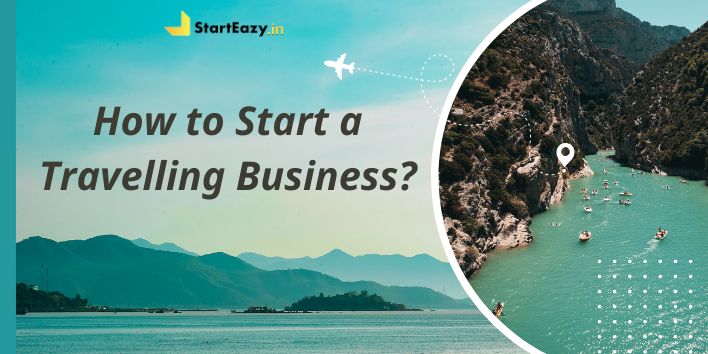How to Start a Travelling Business and Live the Dream

Travelling is a passion for many people, and it is becoming an increasingly popular way to explore the world. With the growth of the tourism industry, there are many opportunities for those who are looking to start a travelling business in India. In this blog, we will take a look at how to start a travelling business in India.
Steps to Start a Travelling Business
Step 1: Research the Market
Before starting any business, it is essential to conduct market research to understand the current trends in the industry.
This is especially important when starting a travelling business, as there are many factors that can affect the success of your business.
One of the best ways to conduct market research is to use a customer persona template.
It will help you to understand your ideal customer and what they are looking for in a travelling business.
Some of the questions you should consider when creating a customer persona include:
- What does your ideal customer look like?
- What does your ideal customer do?
- What are their motivations?
- How will they use your product or service?
- How much money do they have?
- Where will they spend it?
Once you have created a customer persona, you can use it to research the following and make a business plan:
- Understand the current trends in your industry
- Understand what is going on in the market and if you can provide a service that people need
- Know your target audience and what they are looking for
- Find out how competitive your industry is, who you should compete with, and how much competition there is already
A clear business plan is essential for any successful travel business.
Make sure your plan includes your target market, marketing strategies, financial projections, and growth plans.
Step 2: Find your Target Audience
Once you have conducted market research, the next step is to find your target audience.
Your target audience is the group of people who will buy your product or service.
In the case of a travelling business, this could include:
- Tourists
- Business travellers
- Backpackers
- Families
- Students
To find your target audience, you should:
- Find out what services and locations they want
- Find out what their interests are
- Find out what their pain points are
- Find out where they spend their time
- Identify their demographics
By understanding your target audience, you can tailor your services to meet their needs, which will increase the likelihood of success for your business.
Step 3: Consider the Costs and Funding Sources
Starting a travelling business in India requires a considerable amount of investment.
The costs involved depend on several factors like the type of business, location, size, and scope.
Here's a breakdown of the typical costs involved in starting a travelling business in India:
-
Legal and licensing fees: You will need to register your business entity, obtain necessary permits and licenses from the concerned authorities. The cost of registration and licensing fees can range from INR 10,000 to INR 50,000.
-
Office Space: If you need an office space, the cost varies based on the location and size. Renting a space in a metro city can cost INR 30,000 to INR 1,50,000 per month, while a smaller city can cost INR 10,000 to INR 50,000.
-
Equipment and technology: Depending on the type of travelling business, you may need to purchase equipment like vehicles, cameras, or other technology. This can cost INR 5,00,000 to INR 50,00,000 or more, depending on the scale of the business.
-
Marketing and advertising: In order to attract customers, you will need to invest in marketing and advertising campaigns. This can cost anywhere between INR 50,000 to INR 5,00,000 or more, depending on the marketing strategies you employ.
-
Staffing and employee benefits: If you plan to have employees, you will need to consider the cost of salaries, benefits, and other expenses like office supplies, training, and travel expenses. The cost of staffing can range from INR 1,50,000 to INR 10,00,000 or more, depending on the size of the team.
Overall, the cost to start a travelling business in India can range from INR 10 Lacs to INR 1 Crore or more.
However, the costs can be offset through various funding sources, including:
-
Personal savings: If you have personal savings, you can use them to finance your business.
-
Loans: You can approach banks and other financial institutions for loans to finance your business.
-
Crowdfunding: Crowdfunding platforms like Kickstarter, Indiegogo, and Ketto can be used to raise funds for your business.
-
Angel investors and venture capitalists: You can approach angel investors and venture capitalists who may be interested in funding your business in exchange for a stake in your company.
-
Government schemes and subsidies: The government of India offers various schemes and subsidies for small businesses, which can be utilized to offset some of the costs of starting a travelling business.
A travelling business in India can be a costly affair, but the potential revenue streams can make it a profitable venture.

Step 4: Register Your Business with the Government
In India, all businesses need to be registered with the government. The process is relatively simple and can be done online.
You will need to provide digital documents or scanned copies of your documents.
When registering your business, you will need to choose a business structure.
The most common business structures for travelling businesses in India include:
- Private Limited Company Registration Online
- One Person Company
- Limited Liability Partnership
- Sole Proprietorship
- Partnership
Each business structure has its own benefits and drawbacks, so it is important to choose the one that is right for your business.
Step 5: Set up your Website and Get Social Media Accounts
In today's digital age, having a website and social media accounts is essential for any business. Your website is the face of your business, and it should be professional and easy to navigate.
It should also include information about your services, prices, and contact details.
In addition to your website, you should also set up social media accounts on platforms like Facebook, Instagram, Twitter, and YouTube.
These platforms will allow you to reach a wider audience and promote your business to potential customers.
When setting up your website and social media accounts, you should:
- Set up a domain name that is related to your niche.
- Get a hosting plan from a reliable provider.
- Create a professional-looking website with clear branding and look.
- Get an email address that reflects your brand and start building an email list.
- Get social media accounts that match your brand personality and target audience.
- Register for Google AdWords
In addition to having a website and social media accounts, it's important to have a strong online presence.
It includes having positive reviews on review sites, utilizing search engine optimization (SEO) strategies to rank higher on search engines, and having a user-friendly website.
Step 6: Register for Licenses and Permits
In addition to registering your business with the government, you may need to obtain various licenses and permits to operate your travel business legally.
The permits and licenses required to depend on the type of travel business you want to start.
For instance, if you plan to operate a tour agency, you may need to obtain a license from the Ministry of Tourism.
There are several licenses and permits you may need to operate a travel business in India, including:
- Tour operator license: This is required if you plan to organize and sell tour packages.
- Travel agent license: This is required if you plan to sell travel services, such as airline tickets or hotel rooms.
- GST registration: This is required if your annual turnover exceeds Rs. 20 Lacs (Rs.10 Lacs in north-eastern states)
- Shop and establishment license: This is required if you plan to operate a physical office or storefront.
Be sure to research the specific licenses and permits you need for your type of business and location, and obtain them before you start operating.
Step 7: Hire your Team
When planning the team structure for a travel business in India, consider hiring a team of skilled professionals with experience in the travel industry.
For example,
- Tour guides
- Travel agents
- Customer service representatives
Determine the size of the team based on the business goals, and create job descriptions and responsibilities for each role.
Train and motivate the team to deliver excellent customer service and maintain high standards for the business.
Planning and hiring the right team structure is critical for the success of your traveling business in India.
It will can ensure that you have the right people in the right roles to help your business thrive.
Step 8: Build Your Network and Partnerships
Networking and partnerships are crucial for any travel business to succeed.
Your network could include:
- Accommodation providers
- Transport companies
- Tour guides
- Travel agencies
- Activity providers
You need to build relationships with other businesses that can help you grow in the future or provide products or services that will help you grow now.
You can start by attending travel industry events and conferences to meet other travel professionals and build relationships.
You can also reach out to local hotels, airlines, and other businesses that complement your travel services.
Building partnerships with complementary businesses can help you offer bundled services to your customers, increase your reach, and grow your customer base.
For instance, if you operate a tour agency, you can partner with hotels to offer packages that include accommodation and tours.
Moreover, you must attend travel expos, trade shows, and networking events to meet potential partners and suppliers.
Be sure to build relationships with these individuals and companies and keep in touch with them regularly.
Step 9: Determine Your Pricing Strategy
Your pricing strategy will depend on a number of factors, including your target market, the services you offer, and the competition in your industry.
You will need to balance offering competitive pricing with ensuring you make a profit.
Some pricing strategies to consider include:
- Cost-plus pricing: This involves calculating your costs and then adding a markup to determine your final price.
- Value-based pricing: This involves pricing your services based on the value they provide to the customer, rather than on your costs.
- Dynamic pricing: This involves adjusting your prices based on demand, seasonality, or other factors.
- Tiered pricing: This involves offering different pricing tiers for different levels of service or for different customer segments.
Step 10: Launch Your Business
Once you have completed all the necessary steps, it is time to launch your business.
Be sure to have a clear marketing plan in place and use a variety of channels to promote your business, including social media, email marketing, and paid advertising.
Remember that starting a travel business is a process, and it may take time to build a customer base and establish a reputation in the industry.
Be patient, stay focused on providing excellent service, and always be open to learning and improving.
Things you Must do to Start a Successful Travel Agency
- Build your brand - You have to build your brand before you can sell anything. You have to create the kind of company that people will want to associate with. This includes creating an online presence on social media like Instagram and Facebook, building up your email list, and becoming an expert in your niche.
- Build relationships - Building relationships is key to running a successful business. You need to build relationships with other businesses that can help you grow in the future or provide products or services that will help you grow now.








